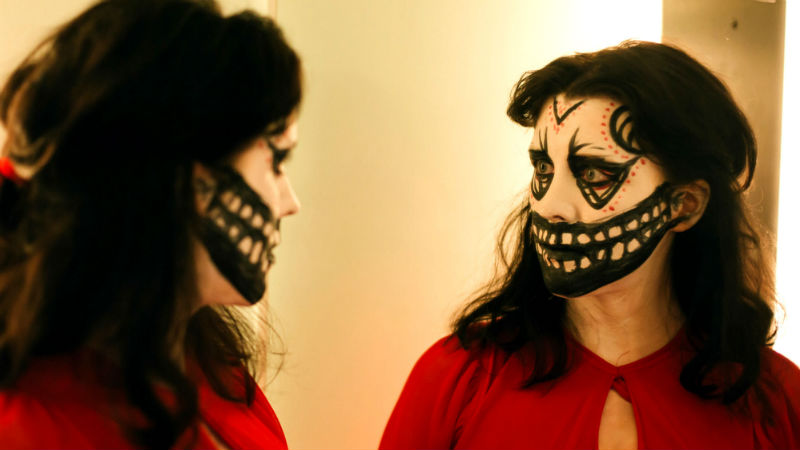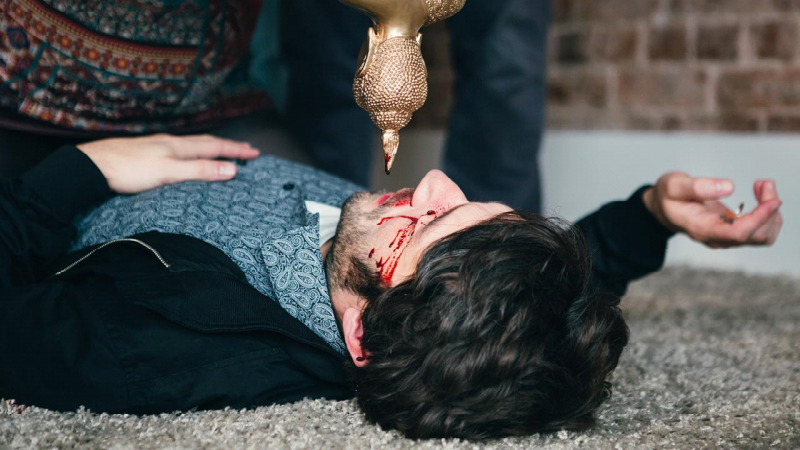The first short film of this horror triptych by British filmmaker Neville Pierce is the psychological terror Lock In (2016, pictured above). It boasts a clever little script concerning a gangster Jimmy (Nicholas Pinnock) visiting a pub just after closing time ostensibly to ask Richard the landlord (Tim McInnerny) for protection money. Richard, meanwhile, is soon to be a granddad: his pregnant daughter Lucy (Sing Street’s Lucy Boynton) is working behind the bar and hits Jimmy over the head with a bottle, knocking him out. Unbeknownst to Lucy, Richard and James have a history as former school teacher and difficult pupil.
Aside from some in car shots and a few exterior pub moments, the whole thing takes place inside the pub. The script packs in a lot in its 10 minutes and is a real gift for a director. Pierce responds with some fantastic casting: McInnerny, a prolific actor who deserves much wider recognition, plays a character who seems to change as revelations alter our perception of him. The catalytic Pinnock lends the whole thing an edge while Boynton is terrific as the daughter confronted with unpleasant home truths (or are they lies?) about her father. Pierce also has a striking feel for pace: the whole thing never lets up and moves along very nicely.
The second short Bricks (2015) adapts Edgar Allan Poe’s short story The Cask Of Amontillado in which one nobleman lures another to his wine cellar to exact a cruel revenge. The Russell/Pierce adaptation shifts the tale to the present day and the two characters to stockbroker William (Blake Ritson), the owner of the wine cellar, and builder Clive (Jason Flemyng), his unsuspecting victim. Which means that the script has the virtue of consisting of just two characters on one set, which makes it reasonably easy to produce as a film. But that virtue could so easily be the film’s downfall: hard to imagine anything potentially more boring than two people in a room.
Fortunately for us viewers, as the two characters from their very different worlds talk, Russell avoids that pitfall and delivers a taut sparring, a game of cat and mouse. Pierce again demonstrates astute casting skills and elicits from both actors performances among the most memorable of their considerable careers. Flemyng claims this film is one of the few times a director has actually given him direction – and you can feel it as you watch. The short has also been championed by no less a director than David Fincher (who directed Flemyng in The Curious Case of Benjamin Button, 2008).
For this writer, however, the best of the three films here is the black and white photographed Ghosted (2016). Again, Russell’s script posits a deceptively simple idea. A widow in search of love and romance visits a restaurant on a series of five dates (the fifth is a man who happens to be at the next table when date number four goes wrong) accompanied by the ghost of her late husband whom she alone can see. It’s an excuse to explore male foibles – narcissism, personal baggage, obsession with tech, earnest intellectualism.
The five dates are beautifully cast, among them Jason Flemyng as a man unable to forget the woman who left him, a very different but arguably equally impressive performance to the one he gave in Bricks. Christien Anholt projects just the right amount of wry observation and world weariness as the dead husband, but the actor who really brings the tale to life is leading lady and comedienne Alice Lowe (Prevenge/2016, Sightseers/2012) who is as good here as she’s ever been (which is saying something). Pierce pulls his various elements together brilliantly: comedy is a notoriously difficult genre to do well, and this one is very funny indeed.
So, an intriguing horror story adaptation, a tense gangster genre outing underpinned by relationships and an hilarious romantic comedy with supernatural overtones. Quite an impressive range of material and all three well executed which makes me, for one, want to see more by this writer-director team. I have no idea what Russell and Pierce will do next (the latter has already made another short with a different writer, unseen at the time of writing) but if they can come up between them with a feature length piece as good as these shorts, we want to see them make it. Meanwhile, the three shorts just released are something of dirty treat.
The Three Neville Pierce Shorts are available to view on Vimeo from Monday, February 5th. Find them here.
The films will also screen on YouTube channel Tall Tales, the new online home for indie films. Lock In will play on Tall Tales from February 6th, Ghosted from February 13th and Bricks later in 2018.










